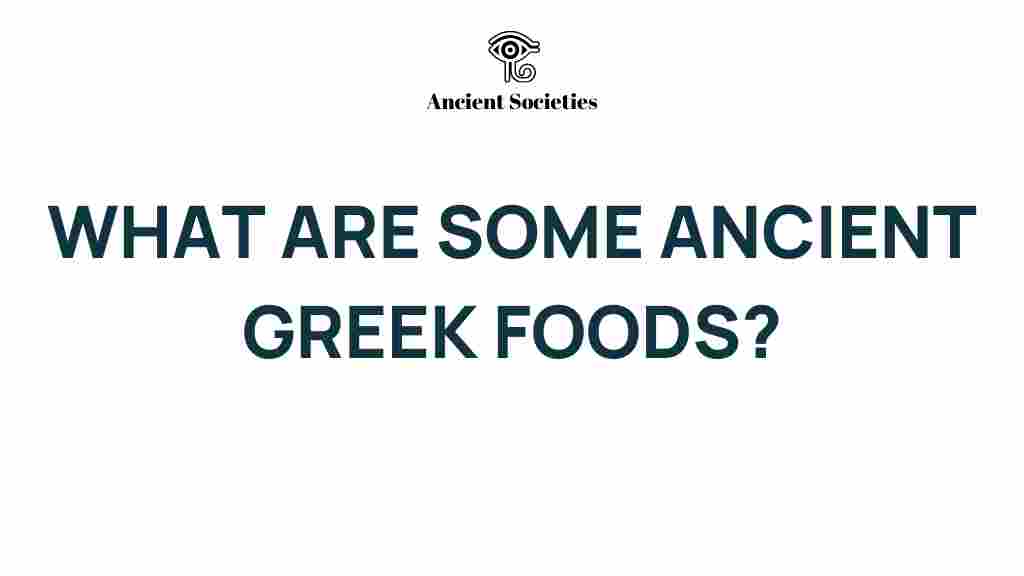Unveiling Ancient Greek Foods: A Culinary Journey Through Time
When we think of ancient Greek foods, the vibrant tapestry of the Mediterranean diet comes to life. This culinary journey through time showcases a rich history of flavors, ingredients, and cooking techniques that have shaped not only Greek cuisine but also the broader scope of Mediterranean cuisine. Ancient diets were heavily influenced by geography, culture, and the availability of local ingredients, leading to a diverse array of traditional dishes that are still celebrated today.
The Foundation of Ancient Greek Gastronomy
At the heart of ancient Greek food culture was a profound respect for the land and its resources. The Mediterranean climate fostered the growth of various crops and animals, which laid the groundwork for what we now recognize as the Mediterranean diet. This diet emphasizes fresh vegetables, fruits, nuts, grains, fish, and olive oil, making it both healthy and sustainable.
- Staple Ingredients:
- Olives and olive oil
- Wheat and barley
- Fruits such as figs and grapes
- Vegetables including onions, garlic, and leeks
- Fish and seafood from the Aegean Sea
- Meats: While meat was not a daily staple for most ancient Greeks, it was reserved for special occasions and religious festivals.
- Herbs and Spices: A variety of herbs like oregano, thyme, and dill were used to enhance flavors.
Historical Recipes: A Taste of the Past
Many historical recipes from ancient Greece have survived through the ages, providing a glimpse into their culinary practices. Here are a few notable dishes:
- Puls: A thick porridge made from barley, often flavored with herbs and cheese.
- Fish with Herbs: Fresh fish seasoned with olive oil and local herbs, grilled or baked to perfection.
- Honey Cakes: Sweet treats made with honey, often served during celebrations.
Exploring the Culinary Heritage of Ancient Greece
To truly appreciate ancient Greek foods, one must delve into their culinary heritage. This includes understanding the role of food in ancient Greek society, from daily meals to lavish feasts. The Greeks celebrated their gods and honored their ancestors through food, making it an integral part of their cultural identity.
Food in Ancient Greek Society
Food was not just sustenance; it was a social lubricant. Meals were often communal, fostering relationships and discussions. The symposium, a social gathering for men, featured elaborate feasts where food and wine flowed freely, and intellectual conversation thrived.
Step-by-Step: Preparing Ancient Greek Dishes
Here’s a simple guide on how to prepare a classic ancient Greek dish, Fassolada, a bean soup that embodies the flavors of the Mediterranean.
Ingredients:
- 1 cup dried beans (such as cannellini or navy beans)
- 1 large onion, chopped
- 2 carrots, diced
- 2 stalks of celery, diced
- 2 cloves of garlic, minced
- 1 can (14 oz) of diced tomatoes
- 1/4 cup olive oil
- Salt and pepper to taste
- Fresh parsley for garnish
Instructions:
- Soak the Beans: The night before cooking, soak the beans in water to soften them.
- Cook the Beans: Drain and rinse the beans. In a large pot, cover them with fresh water and bring to a boil. Reduce heat and simmer until tender, about 1 hour.
- Sauté the Vegetables: In another pan, heat olive oil over medium heat. Add onions, carrots, celery, and garlic, cooking until soft.
- Add Tomatoes: Stir in the canned tomatoes and let it simmer for 10 minutes.
- Combine: Add the cooked beans into the vegetable mixture. Season with salt and pepper and let it cook together for another 10–15 minutes.
- Serve: Garnish with fresh parsley and enjoy your journey back to ancient Greece!
Troubleshooting Tips for Ancient Greek Cooking
Cooking ancient Greek foods can be a delightful experience, but here are some tips to help you along the way:
- Beans Not Softening: Ensure you soak them long enough. If they are still hard, cook them longer.
- Too Much Acid: If your dish is too acidic, balance it by adding a pinch of sugar or honey.
- Flavorless Dish: Always season with salt and herbs generously. Taste as you go!
Ancient Diets and Their Influence on Modern Cuisine
The influence of ancient diets on modern cuisine is profound. Many traditional dishes we enjoy today have roots in ancient Greek cooking. The emphasis on fresh ingredients, healthy fats like olive oil, and a balance of meat and vegetables continues to resonate within the framework of contemporary Mediterranean cuisine.
The Modern Mediterranean Diet
The modern Mediterranean diet has garnered attention for its health benefits, including heart health and longevity. It draws directly from the ancient practices of the Greeks, emphasizing:
- High consumption of fruits and vegetables
- Whole grains as staples
- Healthy fats from olive oil and nuts
- Moderate portions of fish and lean meats
- Low consumption of processed foods and sugars
Conclusion: A Culinary Legacy
As we explore the world of ancient Greek foods, we uncover a rich tapestry of flavors, traditions, and health benefits that have stood the test of time. The legacy of ancient Greek gastronomy continues to influence not only Greek cuisine but also the broader spectrum of Mediterranean cuisine around the globe. By embracing these historical recipes and understanding their cultural significance, we can appreciate the depth of our culinary heritage.
To dive deeper into the world of ancient Greek foods and recipes, check out this comprehensive guide on Mediterranean cuisine. For more insights into the culinary heritage of Greece, visit our food culture page.
This article is in the category Culture and created by AncientSocieties Team
